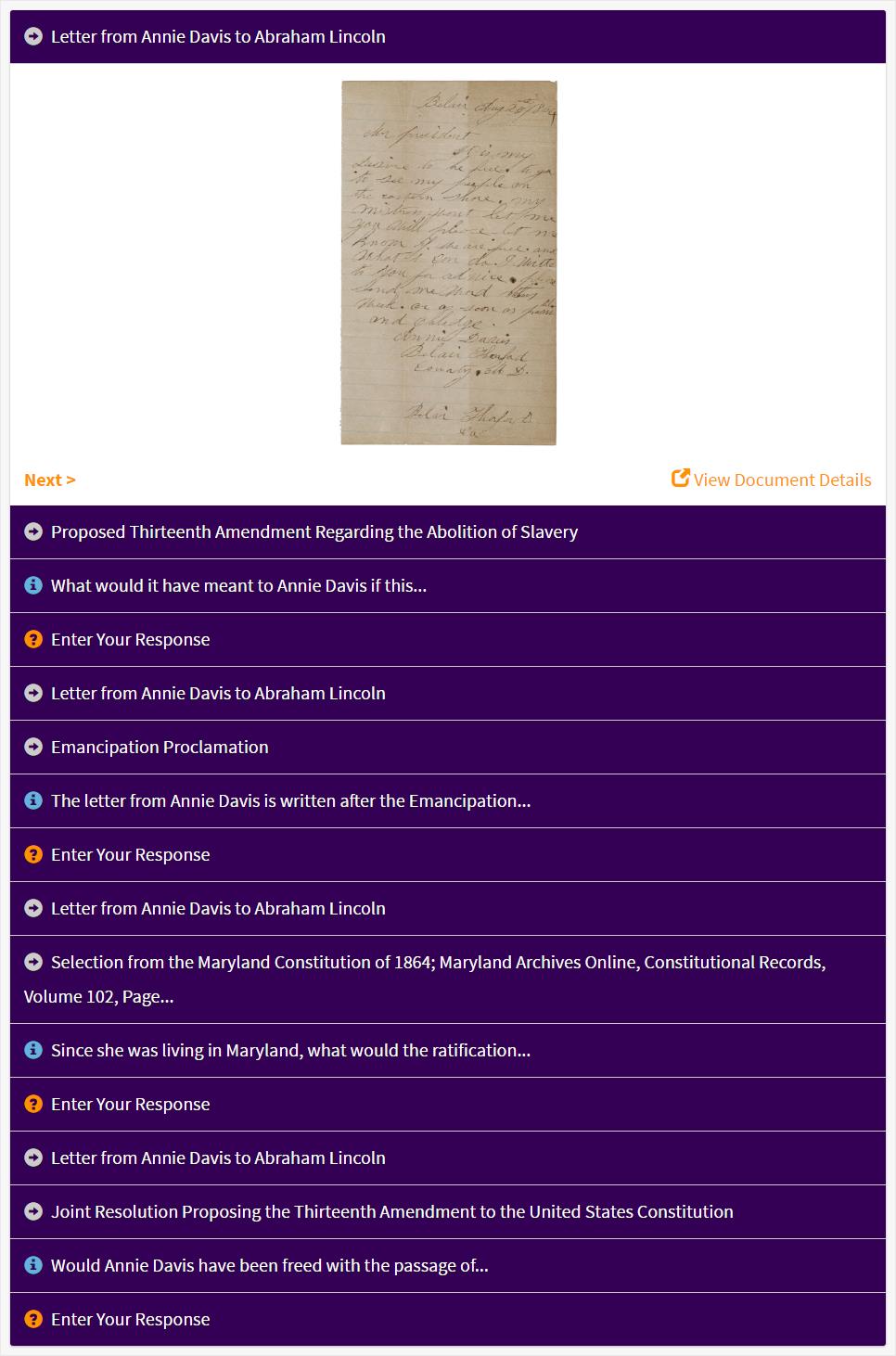Students will study a letter from Annie Davis, a woman who was enslaved in Maryland and wrote a letter to President Abraham Lincoln during the Civil War to find out if "we are free."
The students will decide if she received her freedom from any of four documents: a proposed amendment from 1861 that would have prevented legislation interfering with states' rights to regulate slavery, the Emancipation Proclamation, Maryland's 1864 Constitution, or the Thirteenth Amendment to the United States Constitution.
The students must analyze each document to find out if and when Annie was freed.
Suggested Teaching Instructions
Many students do not realize that the Emancipation Proclamation did not free all enslaved people in the United States in 1863. Not until the Thirteenth Amendment, ratified on December 6, 1865, did the entire enslaved population receive their freedom. Annie Davis had been freed the year before according to Maryland's new constitution in 1864.
This activity can help introduce students to the Emancipation Proclamation, or provide an opportunity for older students for an in-depth class discussion about the politics and legal complications of emancipation. For grades 6-8, or as a warm-up activity for high school students. Approximate time needed is 10-15 minutes.
Project the activity for the entire class. Click on the first document and read it with students: Annie Davis's letter (view the transcript if the script is too challenging).
Model document analysis for students, and determine that Annie lived in Maryland. Explain that Maryland was a slave-holding state, but it did not choose to secede from the Union and join the Confederate States of America. The border states of Maryland, Delaware, Kentucky, and Missouri were the four slave states that made the choice to stay with the Union.
Click on "View Document Details" on the next document. This document is a proposed 13th Amendment from 1861 that was never ratified by the states. Discuss the question posed in the box following the document with students: "What would it have meant to Annie Davis if this amendment had been ratified by the states?"
It would have let each state decide upon slavery and would NOT have freed Annie Davis.View Annie Davis's letter again and then click on the Emancipation Proclamation. Choose "View Document Details" and read the transcript.
Ask students to read the second paragraph of the text and lead a class discussion about the fate of Annie Davis based on the question inside the next box in the slideshow. Would the Emancipation Proclamation have freed her?
No, it applied only to states that had seceded from the Union, leaving slavery untouched in the loyal border states. (It also expressly exempted parts of the Confederacy that had already come under Northern control.)
View Annie Davis's letter again and then click on the selection from the Maryland Constitution of 1864. Click on the image to enlarge it and see the citation. Would this document have freed her?
At the time of writing on August 25th, no. But Davis would be free two months later when Maryland's new constitution went into effect on October 29, 1864. It says "all persons held to service or labor as slaves are hereby declared free."
Look at Annie's letter one more time, and then the draft of the 13th Amendment that eventually passed. Click on "View Document Details" and read the document's transcript. Discuss: Would the 13th Amendment have freed her (if she hadn't already been freed)?
Yes, it formally abolished slavery in the United States. It says: ''Neither slavery nor involuntary servitude, except as a punishment for crime whereof the party shall have been duly convicted, shall exist within the United States, or any place subject to their jurisdiction.''
After discussing the impact of the 13th Amendment, click on "I'm Done" and discuss the first two concluding questions:
1. Which document freed Annie Davis?
2. Which document(s) did not free Annie and why?
Ask students to write a letter back to Annie Davis as if from President Lincoln. Discuss why Davis would not have been free when she wrote the letter, but soon would have due to Maryland's actions. Explain also that even if she'd lived outside of Maryland, in a state that did not end slavery, she would have been freed by the 13th Amendment.
This activity was based on a lesson by Michael Hussey and Liz Eder, published in the article "It is my Desire to be Free: Annie Davis's Letter to Abraham Lincoln and Winslow Homer's Painting A Visit from the Old Mistress," in the May/June 2010 National Council for the Social Studies (NCSS) publication Social Education.Extension: Students can discuss the changing roles between the enslaved person and the former mistress, and suggest what each person might be thinking in
"A Visit from the Old Mistress," by Homer Winslow.





